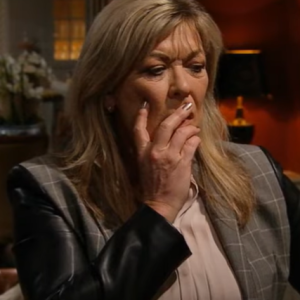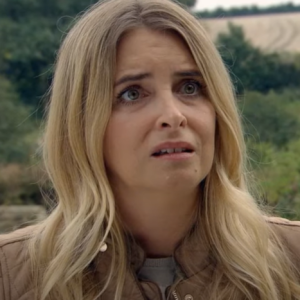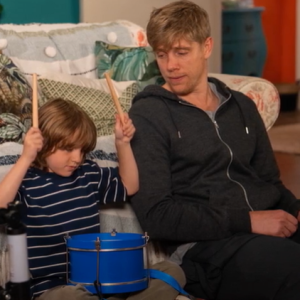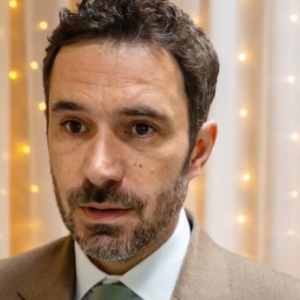In the heart of the Dales, the shadow of grief hangs heavy, a tempest that refuses to yield. It rips through the very fabric of families, dredging up the ghosts of the past and leaving a trail of wreckage that forever alters the landscape of lives. Right now, that storm bears the devastating name of Nate Robinson, and at its epicentre stands his father, Cain Dingle. A man whose soul is already a battleground for a lifetime of demons, he is now forced to confront the most gut-wrenching tragedy imaginable: the death of a son he was only just beginning to know, a son he was only just starting to tentatively build bridges with.
But in Emmerdale, when is grief ever simple? When is it ever merely about the quiet, solemn act of mourning? The air in the village is thick, not just with the profound sorrow of loss, but with the corrosive tang of suspicion, the bitter bite of accusation, and a profound sense of injustice that threatens to curdle even the purest intentions. And in a night destined to become a defining moment in the Dingle saga, that bitterness walked right through the hallowed doors of the Woolpack in the formidable shape of Cara Robinson, Nate’s mother. A woman bearing the unbearable weight of a mother’s loss, her every fibre screaming for someone, anyone, to blame.
Let’s set the scene, because it’s a canvas painted with Dingle family tragedy at its most raw, complicated, and utterly heartbreaking. Nate is gone, his vibrant life brutally cut short, and the ever-present shadow of the law still lingers. The police, their eyes lingering far too long on Cain Dingle – the infamous village tough man with a history as tangled as the Yorkshire knot – are still sniffing around, their inquiries a constant, nagging reminder of the violence that permeated Nate’s final hours.
For Nate’s grieving ex-wife, Tracy Metcalfe, this creeping suspicion surrounding Cain is more than enough. In the face of her unimaginable pain, she has drawn a definitive line in the sand, a hard, uncrossable boundary that speaks volumes of her anguish and her distrust. Cain Dingle, and by painful extension, his entire chaotic clan, are emphatically banned from the official funeral. Can you imagine the excruciating sting of that? To be told you cannot formally say goodbye, cannot bear witness to the final farewell of your own son, your own blood? It is a cruel, soul-crushing blow, leaving the Dingles with only one agonizing option: to do what they do best. They retreat to their fortress, the hallowed, often turbulent halls of the Woolpack, to hold their own memorial – a makeshift farewell for a man they all, in their own profoundly dysfunctional and often complicated ways, truly cared for.
As the pivotal episode opened, the atmosphere inside the Woolpack was as bleak and dreary as a Yorkshire winter sky. A painfully sparse scattering of loyal family members dotted the tables, their faces etched with grief. The silence was a heavy, suffocating blanket, punctuated only by the mournful clink of a glass or a stifled, ragged sigh. At the heart of it all sat Cain, a tormented statue carved from regret and guilt. His broad shoulders, usually so defiant, were slumped under an invisible weight. The familiar fire in his eyes, a hallmark of his formidable personality, had been reduced to nothing more than smouldering embers of pain. This was not the hard-as-nails man of the Dales; this was a broken father, utterly lost in a swirling sea of ‘what-ifs’ and ‘if-onlys’. The crushing weight of his final violent confrontation with Nate – a brutal beating delivered on the very day Nate died – was visibly crushing him, a self-inflicted wound far deeper than any physical blow.
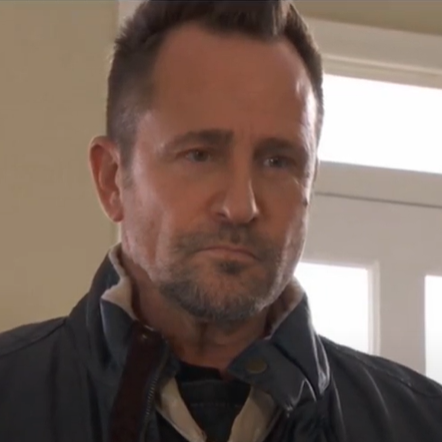
Witnessing his brother drowning in such profound misery, Caleb Milligan, ever the pragmatist with a deep understanding of the Dingle psyche, stepped in. With the classic Dingle philosophy that you either sink into sorrow or swim in defiance, he encouraged Cain to change the tune. Literally. “This isn’t Nate,” he urged, his voice resonating with a quiet strength, “a quiet, moping affair. Let’s toast the man we knew, the one with the spark, the fight, the Dingle spirit.” And so, the somber, funereal music was replaced with something more lively, a defiant beat against the encroaching darkness. The whiskey began to flow more freely. A toast was raised, then another, then another. Slowly, almost imperceptibly, the mood began to lift, transforming from a mournful wake into something akin to a boisterous, imperfect celebration of a life lived, however tragically short. They were trying to honor him in their own loud, raucously imperfect ways, a testament to their unique family bonds.
And that’s precisely when the pub doors swung open with a dramatic creak. Cara Robinson stood silhouetted in the doorway, her face a mask of thunderous disbelief, her eyes taking in the scene before her. The laughter died abruptly in their throats. The music, which moments before had sounded like a defiant anthem, now suddenly sounded jarring, disrespectful, an affront to the very notion of mourning. Every eye in the room pivoted, transfixed by the woman who had travelled a great distance to bury her only child, only to walk into what looked, to her horrified eyes, like a party.
“Having a good knees-up, are we?” she spat, her voice dripping with a venom that cut through the entire room, her words hanging in the suddenly brittle air. “And here’s me thinking it would be a somber affair, seeing as we’re burying my son tomorrow.” Her words, delivered with chilling precision, hit them like a physical blow. She revealed she’d arrived a day early for the official funeral, wanting to prepare herself, to steel herself for the unbearable, only to be met with the shocking news that the Dingles were holding a rival memorial. To Cara, consumed by her own profound grief and fury, this wasn’t an act of love born from cruel exclusion. It was a calculated slap in the face. It was a desecration of her beloved son’s memory, a brazen disrespect.
Her gaze, blazing with a righteous fury that only a grieving mother can truly possess, found Cain. All her pain, all her raw, uncontained rage, funneled into one blistering, inevitable confrontation. She closed the distance between them, her voice dropping to a low, dangerous growl. “I know what you did. I know exactly what you did to Nate. The last time anyone saw him, the police told me.” The pub was silent. You could hear a pin drop, the collective breath of the Dingles held in terrified anticipation. She was talking about the fight, the brutal, ugly, final chapter in their turbulent father-son story. To Cara, this wasn’t just a tragic coincidence; it was the final, damning proof of Cain’s inherent character. “You’re a violent thug, Cain Dingle. That’s all you’ve ever been.” With a final, soul-destroying curse upon the very day Nate ever came looking for his father, she turned on her heel and stormed out, leaving a shattered Cain and a stunned, bewildered pub in her wake.
Her destination was Vanessa Woodfield’s house, a sanctuary where she could find solace with Tracy. The two women, united in their profound loss, were preparing for the unbearable day ahead. But another crucial piece of the puzzle was about to fall into place. Earlier that day, a cold, official letter had arrived for Tracy, informing her that she was the beneficiary of a significant life insurance payout from Nate’s death. In the raw, chaotic aftermath of her grief, it was just another piece of painful bureaucracy, a grim financial reality amidst the emotional devastation.
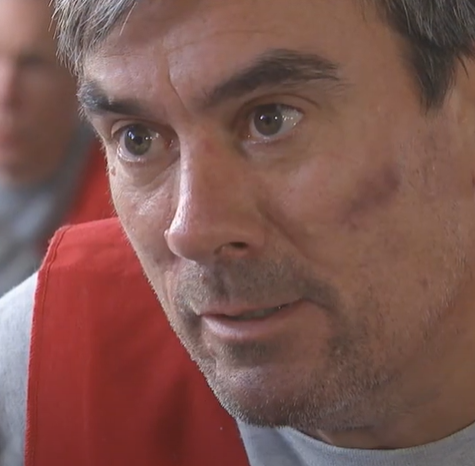
But nothing in Emmerdale stays secret for long. Sam Dingle, ever the loyal soldier, his heart bleeding for his broken brother, couldn’t let Cara’s scathing words stand. He followed her to Vanessa’s house, his earnest face a picture of determination, desperate to make her see that Cain, for all his undeniable faults, was not a cold-blooded killer. He pleaded his brother’s case, his heart on his sleeve, a testament to the fiercely protective Dingle bond. But during their tense, emotionally charged conversation, Sam’s keen ears overheard the mention of Tracy’s unexpected payout. And in Sam’s simple, loyal mind, a terrible, horrifying new possibility took root, twisting the facts into a dark, distorted narrative.
He raced back to the Woolpack, his mind reeling with the shocking information. He found Cain stewing in the devastating aftermath of Cara’s public attack and delivered the news, the words tumbling out in a rush: “Tracy has money troubles. Nate had a life insurance policy. Tracy is getting a huge payout.” The pieces, for a man already teetering on the brink of sanity, clicked together in the most horrifying, warped way imaginable. For Cain, consumed by guilt, grief, and Cara’s accusations, this information was like throwing gasoline on an already raging fire. The last vestiges of reason, the fragile hold on rational thought, burned away in an instant.
Cain saw red. In an explosion of raw, misdirected fury, a desperate lashing out from a man so broken he needed someone else to carry the crushing weight of blame, he stormed over to Vanessa’s house. He didn’t knock. He burst in, a hurricane of accusation, his entrance so violent it sent tremors through the quiet domestic scene. The three women – Cara, Tracy, and Vanessa – stared at him, shocked, their faces a mixture of disbelief and fear. Before they could even speak, he unleashed his poison, his eyes locking onto a bewildered Tracy. He accused her, in the most vile and unthinkable terms, of orchestrating the ultimate betrayal: of killing her own husband for the life insurance money to solve her pressing financial problems. The accusation hung in the air, toxic and utterly unbelievable, a dagger to Tracy’s heart.
He had twisted a tragic reality into a monstrous motive, turning his unimaginable pain outwards and aiming it squarely at the one person who, besides himself, shared his profound loss the most. As Cara and Vanessa looked on in unadulterated horror, and Tracy’s face crumpled in a mixture of disbelief, devastation, and profound hurt, Cain delivered his final, defiant blow, a statement of intent born of pure, unadulterated agony. He wasn’t asking for permission anymore. He was making a declaration. “Well, I’m coming to the funeral,” he snarled, his voice raw with a pain he could only express as rage. “We’re all coming, whether you like it or not.”
The battle lines have been irrevocably drawn. A funeral meant to be a time of solemn peace and respectful remembrance is now set to become an explosive war zone. With a grieving mother convinced he’s a heartless thug, and a grieving father convinced his son’s widow is a calculating murderer, the day they lay Nate Robinson to rest promises to be anything but peaceful. It is a tragedy layered on top of a mystery, wrapped in the explosive, heartbreaking drama that only the Dingles, in all their glorious, chaotic dysfunction, can deliver. The consequences of Cain’s one, terrible mistake will reverberate through the Dales for a long, long time to come.
